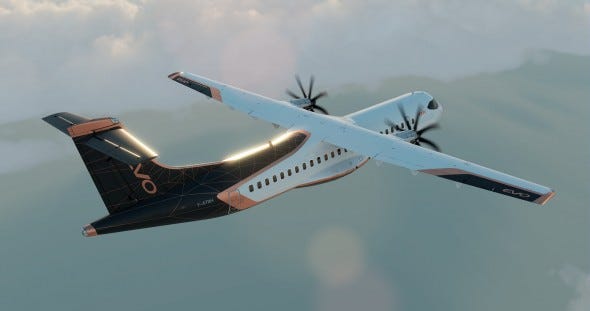2 Farnborough presentations show different approaches to sustainability
Issue #22 of Sustainability in the Air Newsletter
At yesterday's Farnborough Air Show, we attended two sustainability-focused sessions, one from turboprop maker ATR, and another from Italian airline (and Alitalia successor) ITA Airways.
We’ll have a look at both, given the very different approach each company took.
ATR used Farnborough to present a market outlook, the headline being the forecast of almost 2500 more turboprop aircraft being needed over the next 20 years to foster regional connectivity and (crucially) to lower emissions.
ATR’s Stefano Bortoli (CEO) and Fabrice Vautier (SVP) reeled off an authoritative list of facts and figures about how turboprops are a more sustainable alternative for regional aviation.
For example, if regional jets were to be converted to turboprops today, ATR claims it would save 971k tonnes of CO2, equivalent to a forest the size of the Balearic Islands.
Stefano Bortoli also said that ATR customers would be able to use their fleet at 100% SAF once certified (goal 2025), at no additional cost to themselves, except of course for the SAF itself.
This comes as ATR ran the first-ever commercial flight last month, where both engines used 100% SAF.
ATR’s presentation was also impressive in the way that it wove together sustainable aviation and the benefits air connectivity brings to communities.
ATR says that an increase of 10% in regional flights results in an 8% increase in foreign investment in a community.
We emphasised the need for this kind of messaging in the current edition of AMM (free download), given that climate change activists are starting to run with the narrative of air travel being something done by a selfish global elite burning greenhouse gases at the expense of the majority.
Shortly after the ATR presentation, ITA Airways staged the launch of its sustainability manifesto in the Airbus pavilion.
The manifesto, fronted by CEO Fabio Maria Lazzerini was glossy, but short on specifics.
Most of it seemed to revolve around a fleet renewal programme, which does have fuel efficiency benefits but is of course being done for economic reasons.
ITA Airways also talked about offsetting emissions, but that this will encompass a voluntary offsetting programme, rather than the airline taking care of it directly.
There were no details on how this will work.
A notable omission was that Fabio Maria Lazzerini did not mention the airline’s recent participation in the SkyTeam Sustainable Flight Challenge.
Here the airline actually won the award for best CO2 reduction/medium haul.
However, one element that is worth noting is that ITA Airways defines sustainability in the broadest sense - as a sustainable business, that is connected to society as a whole.
As a result, the manifesto includes commitments to diversity and inclusion when it comes to employee management.
Collaboration news
Microsoft, Alaska Airlines Back CO2-to-Jet-Fuel Technology (Wall Street Journal)
Sustainability news
Ravn Alaska Orders 30 Hydrogen-Electric Engines from ZeroAvia (Cision)
Etihad Airways named ‘Environmental Airline of 2022’ (Breaking Travel News)
Saudia wins customer and employee engagement awards for sustainability (International Airport Review)
Sky’s the limit as UK sets out strategy to reach net zero aviation and deliver guilt-free flying (UK Government)
Emirates catering unit opens world’s largest vertical farm (Sustainability)




